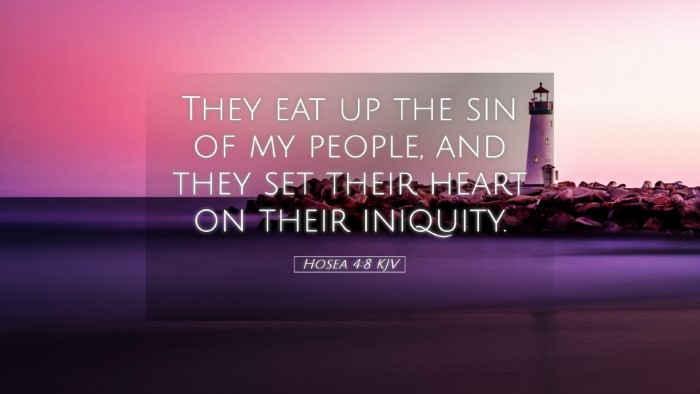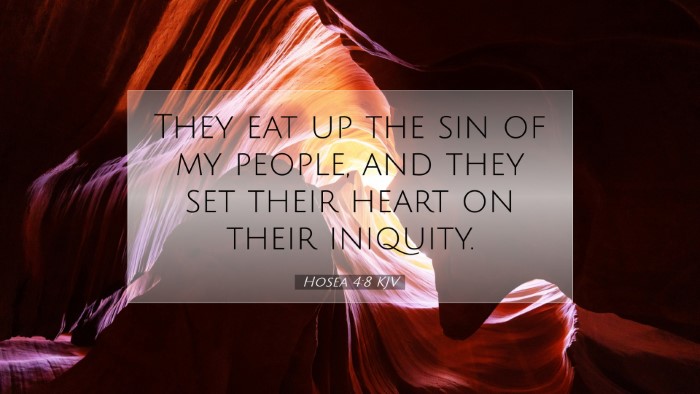Old Testament
Genesis Exodus Leviticus Numbers Deuteronomy Joshua Judges Ruth 1 Samuel 2 Samuel 1 Kings 2 Kings 1 Chronicles 2 Chronicles Ezra Nehemiah Esther Job Psalms Proverbs Ecclesiastes Song of Solomon Isaiah Jeremiah Lamentations Ezekiel Daniel Hosea Joel Amos Obadiah Jonah Micah Nahum Habakkuk Zephaniah Haggai Zechariah MalachiHosea 4:8
Hosea 4:8 KJV
They eat up the sin of my people, and they set their heart on their iniquity.
Hosea 4:8 Bible Commentary
Commentary on Hosea 4:8
Text of the Verse: "They eat up the sin of my people, and they set their heart on their iniquity." - Hosea 4:8
Contextual Overview
The book of Hosea is a prophetic text that addresses the unfaithfulness of Israel, portraying God’s deep anguish over His people’s defection. The verses surrounding Hosea 4:8 reflect the pervasive moral decay among both the Israelites and their leaders, particularly the priests.
In this verse, the metaphor of "eating up" signifies a voracious and greedy consuming of sin, both literally and spiritually, by the priests who ought to guide the people towards righteousness.
Exegesis of Hosea 4:8
This verse encapsulates the relationship between sin, leadership, and accountability. The priests, intended to be spiritual leaders, instead become agents of sin, indulging in the very iniquities they are supposed to oppose.
- Consumption of Sin: The phrase "they eat up the sin of my people" illustrates how the priests profit from the sins of the community. Rather than being shepherds guiding the flock, they prey upon the weaknesses of the people, which leads to moral corruption.
- Setting Heart on Iniquity: The latter part, "they set their heart on their iniquity," indicates not only an acknowledgment of sin but also a deliberate choice to embrace it. This reflects a heart condition where leaders actively choose evil over good, suggesting a rootedness in moral failure rather than momentary lapses.
Insights from Commentaries
Matthew Henry's Commentary
Matthew Henry emphasizes the tragic irony in the priests’ behavior: while they are supposed to intercede for God’s people and lead them to holiness, they exploit their positions for personal gain. He notes that "eating up" refers to the accruement of spiritual and material benefits derived from the people's transgressions. Henry warns that this behavior is not without consequence, as God will demand accountability from those who mislead His children.
Albert Barnes' Notes on the Bible
Albert Barnes elaborates on the implications of "eating up the sin," explaining that it signifies indulging in and benefitting from the sin of the people. He draws attention to the dangers of allowing false teachings to propagate among the leaders, resulting in a collective spiritual degradation. Barnes encourages a return to genuine piety, urging leaders to resist greed and corruption, as such behavior leads to national ruin.
Adam Clarke's Commentary
Adam Clarke presents a poignant observation on the character of false priests and the consequences they bring upon the community. He notes that "they eat up" suggests a gluttonous appetite for sin that corrupts both leader and follower alike. Clarke's analysis points towards the indictment of failed leadership, where personal lusts overshadow the sacred duty of guiding others towards God.
Theological Implications
The implications of Hosea 4:8 extend beyond the immediate context of Israel's priesthood. It serves as a cautionary tale for contemporary religious leadership, emphasizing the need for integrity and spiritual accountability. The verse acts as a reminder that leaders are called to exemplify righteous living and should not seek personal gain at the expense of God’s people.
- Leadership Accountability: There is a divine expectation for spiritual leaders to maintain a high moral standard, as they are accountable to God for the well-being of their flocks.
- Warning Against Complicity: Just as God holds leaders accountable, the community bears the responsibility of discerning true from false leadership to avoid complicity in sin.
Practical Applications
For pastors, theologians, and students, Hosea 4:8 serves as a foundational text for discussions surrounding ethical conduct in ministry. Here are some practical takeaways:
- Self-Examination: Leaders should continually reflect on their motivations and ensure that their actions align with God’s calling rather than personal ambition.
- Encouraging Righteousness: Pastors should be proactive in fostering an environment where sin is confronted, and righteousness is championed, ensuring accountability among the congregation.
- Discerning Leadership: Educators and leaders must equip congregants with knowledge of scripture to help them recognize and reject misleading teachings.
Conclusion
Hosea 4:8 powerfully portrays the perils of corrupt leadership and the tragic consequences for the people. The insights from various commentaries provide a strong basis for understanding the spiritual health of a community is intertwined with the integrity of its leaders. This passage calls all believers, especially those in positions of authority, to a deeper commitment to righteousness, accountability, and the promotion of God’s truth.


